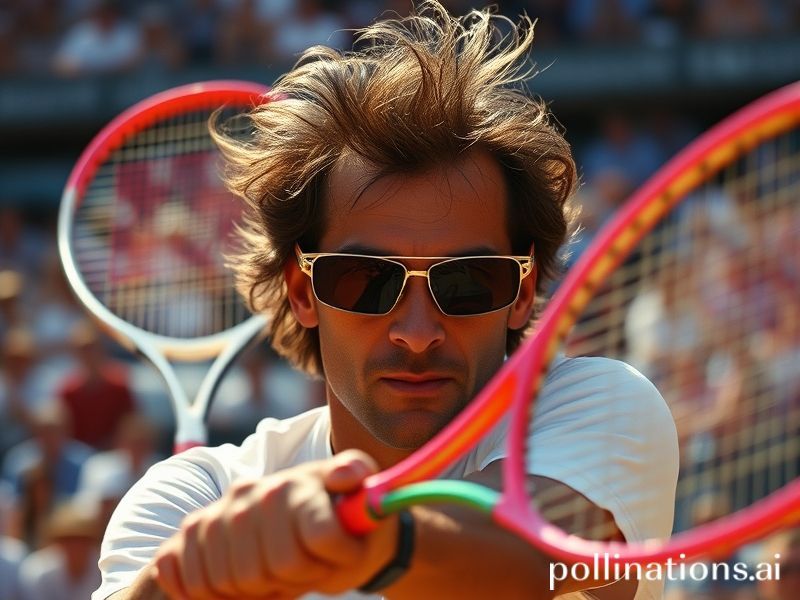Andre Agassi: The Reluctant Messiah Who Monetized Defeat for the Entire Planet
Andre Agassi: The Bald Prophet Who Sold Reeboks to Beijing While Teaching Us How to Lose Gracefully on a Global Scale
By Dave’s Locker International Desk
If you squint hard enough from a rooftop bar in Dubai, the arc of Andre Agassi’s career looks less like a tennis parabola and more like a geopolitical fever dream: a child soldier in the neon trenches of Las Vegas, groomed by a Persian-Armenian father who taped a ping-pong paddle to his highchair; later, a pony-tailed mercenary hawking Canon cameras to a planet that was just learning to pronounce “glasnost”; still later, a shaved-headed elder statesman building charter schools in Nevada while the rest of the world googled “how to launder oligarch money through elite sports academies.”
Agassi’s first rebellion was against the tyranny of his own hair. In 1990, the mullet came off like a Cold-War wall, revealing a solar-panel scalp that reflected satellite dishes of flash photography from Monte Carlo to Monte Carlo. Overnight, the slogan “Image is everything” became both punchline and prophecy: the Berlin Wall had fallen, but capitalism was just warming up its serve. Reebok, Nike, and every sweatshop in between sprinted to the baseline, discovering that a bald teenager from the Nevada desert could outsell geopolitical summits. When Agassi lost—spectacularly, theatrically—he still won, because the footage could be spliced into a redemption arc before the next news cycle. CNN International had discovered narrative methamphetamine, and Agassi was the spoon.
Across continents, dictators and democrats alike borrowed the template. Singapore’s Lee Kuan Yew wanted discipline? Cue Agassi’s early-morning drills. Brazil’s favela kids needed hope? Roll tape of the rebel-turned-philanthropist. Even the Kremlin, still dizzy from vodka and perestroika, imported Agassi’s highlight reels to demonstrate that individual flair could coexist with state control—so long as the flair sold enough mineral water. By 1995, when Agassi finally captured the U.S. Open, the victory was less about a silver trophy and more about a global infomercial: “Yes, you too can escape your father’s basement and monetize the entire planet.”
The irony, of course, is that Agassi hated tennis. He admitted it in his memoir with the candor of a man confessing to tax evasion on live television. While the rest of us were busy stapling his posters to dorm-room walls, he was busy stapling his soul back together after every multimillion-dollar tantrum. The world applauded; the stock markets winked; meanwhile, somewhere in Jakarta, a twelve-year-old practiced topspin with a borrowed racquet, dreaming of the day he too could loathe the sport that might liberate his family from tin-roof poverty. Globalization, it turns out, is just franchised existential dread with better lighting.
Later, Agassi leveraged guilt into infrastructure. Charter schools in the Nevada desert, college prep in post-Katrina New Orleans, after-school programs in Soweto—each initiative stamped with the quiet panic of a man who knows he’ll never outrun the Nike swoosh on his résumé. The UN sends envoys; venture capitalists send PowerPoints; the kids send standardized-test scores that fluctuate like crypto. Somewhere in Davos, a panel moderator asks whether sports heroes can ever atone for the commodification of childhood. Agassi doesn’t attend; he’s busy drilling forehands with a thirteen-year-old whose parents crossed three borders to get here. The circle of life, Vegas-style.
Today, as Wimbledon’s strawberries rot under carbon-footprint scrutiny and Saudi Arabia hosts exhibition matches on courts cooled like server farms, Agassi’s legacy reads like a cautionary fable wrapped in a sponsorship deal. The planet is hotter, attention spans shorter, and every prodigy now comes with an NFT. Yet the moral endures: you can rage against the machine, but the machine will simply sign you to a licensing agreement. The trick, perfected by one bald oracle in denim shorts, is to serve the ball so hard that the echo keeps paying dividends long after the crowd has left.
And so we toast Andre Agassi: the reluctant messiah of late-stage capitalism, the only man who managed to weaponize both victory and defeat into a diversified portfolio. Somewhere in the metaverse, his avatar is still chasing drop shots while the rest of us chase relevance. Game, set, compound interest.







